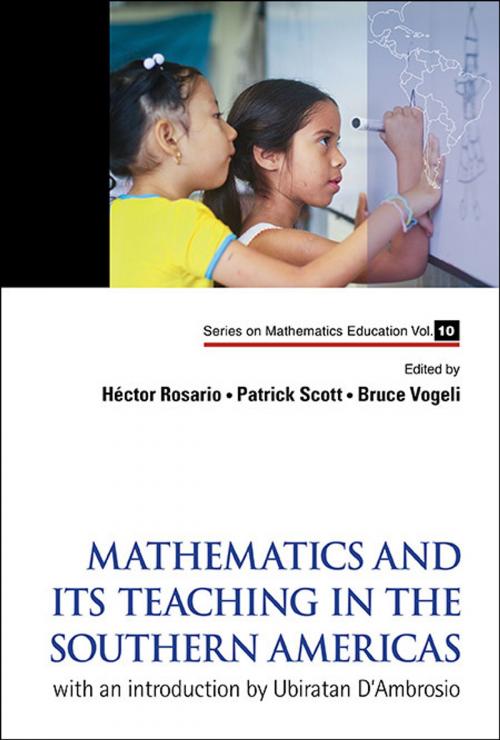Mathematics and Its Teaching in the Southern Americas
with An Introduction by Ubiratan D'Ambrosio
Nonfiction, Science & Nature, Mathematics, Study & Teaching| Author: | Patrick Scott, Bruce Vogeli, Héctor Rosario | ISBN: | 9789814590587 |
| Publisher: | World Scientific Publishing Company | Publication: | September 26, 2014 |
| Imprint: | WSPC | Language: | English |
| Author: | Patrick Scott, Bruce Vogeli, Héctor Rosario |
| ISBN: | 9789814590587 |
| Publisher: | World Scientific Publishing Company |
| Publication: | September 26, 2014 |
| Imprint: | WSPC |
| Language: | English |
This anthology presents a comprehensive review of mathematics and its teaching in the following nations in South America, Central America, and the Caribbean: Argentina, Bolivia, Brazil, Chile, Colombia, Costa Rica, Cuba, Guyana, Haiti, Honduras, México, Panamá, Paraguay, Perú, Puerto Rico, Trinidad and Tobago, and Venezuela. The last summary of mathematics education encompassing countries from the Southern Americas appeared in 1966. Progress in the field during five decades has remained unexamined until now.
Contents:
- ARGENTINA: A Review of Mathematics Education through Mathematical Problems at the Secondary Level (Betina Duarte)
- BOLIVIA: An Approach to Mathematics Education in the Plurinational State (A Pari)
- BRAZIL: History and Trends in Mathematics Education (Beatriz S D'Ambrosio, Juliana Martins, and Viviane de Oliveira Santos)
- CHILE: The Context and Pedagogy of Mathematics Teaching and Learning (Eliana D Rojas and Fidel Oteiza)
- COLOMBIA: The Role of Mathematics in the Making of a Nation (Hernando J Echeverri and Angela M Restrepo)
- COSTA RICA: History and Perspectives on Mathematics and Mathematics Education (Ángel Ruiz)
- CUBA: Mathematics and Its Teaching (Otilio B Mederos Anoceto, Miguel A Jiménez Pozo, and José M Sigarreta)
- GUYANA: The Mathematical Growth of an Emerging Nation (Mahendra Singh and Lenox Allicock)
- HAITI: History of Mathematics Education (Jean W Richard)
- HONDURAS: Origins, Development, and Challenges in the Teaching of Mathematics (Marvin Roberto Mendoza Valencia)
- MÉXICO: The History and Development of a Nation and Its Influence on the Development of Mathematics and Mathematics Education (Eduardo Mancera and Alicia Ávila)
- PANAMÁ: Towards the First World through Mathematics (Euclides Samaniego, Nicolás A Samaniego, and Benigna Fernández)
- PARAGUAY: A Review of the History of Mathematics and Mathematics Education (Gabriela Gómez Pasquali)
- PERÚ: A Look at the History of Mathematics and Mathematics Education (César Carranza Saravia and Uldarico Malaspina Jurado)
- PUERTO RICO: The Forging of a National Identity in Mathematics Education (Héctor Rosario, Daniel McGee, Jorge M López, Ana H Quintero, and Omar A Hernández)
- TRINIDAD and TOBAGO: Mathematics Education in the Twin Island Republic (Shereen Alima Khan and Vimala Judy Kamalodeen)
- VENEZUELA: Signs for the Historical Reconstruction of Its Mathematics Education (Fredy Enrique González)
Readership: Graduates and professionals in mathematics education; education planners.
Key Features:
- Featured introduction by Professor Ubiratàn D'Ambrosio of Brazil — the most prestigious of Latin American mathematics educators
- Insights into the impact of political changes of mathematics education in Cuba, Venezuela, Brazil etc.
- Historical references, not available elsewhere, are covered in this book
This anthology presents a comprehensive review of mathematics and its teaching in the following nations in South America, Central America, and the Caribbean: Argentina, Bolivia, Brazil, Chile, Colombia, Costa Rica, Cuba, Guyana, Haiti, Honduras, México, Panamá, Paraguay, Perú, Puerto Rico, Trinidad and Tobago, and Venezuela. The last summary of mathematics education encompassing countries from the Southern Americas appeared in 1966. Progress in the field during five decades has remained unexamined until now.
Contents:
- ARGENTINA: A Review of Mathematics Education through Mathematical Problems at the Secondary Level (Betina Duarte)
- BOLIVIA: An Approach to Mathematics Education in the Plurinational State (A Pari)
- BRAZIL: History and Trends in Mathematics Education (Beatriz S D'Ambrosio, Juliana Martins, and Viviane de Oliveira Santos)
- CHILE: The Context and Pedagogy of Mathematics Teaching and Learning (Eliana D Rojas and Fidel Oteiza)
- COLOMBIA: The Role of Mathematics in the Making of a Nation (Hernando J Echeverri and Angela M Restrepo)
- COSTA RICA: History and Perspectives on Mathematics and Mathematics Education (Ángel Ruiz)
- CUBA: Mathematics and Its Teaching (Otilio B Mederos Anoceto, Miguel A Jiménez Pozo, and José M Sigarreta)
- GUYANA: The Mathematical Growth of an Emerging Nation (Mahendra Singh and Lenox Allicock)
- HAITI: History of Mathematics Education (Jean W Richard)
- HONDURAS: Origins, Development, and Challenges in the Teaching of Mathematics (Marvin Roberto Mendoza Valencia)
- MÉXICO: The History and Development of a Nation and Its Influence on the Development of Mathematics and Mathematics Education (Eduardo Mancera and Alicia Ávila)
- PANAMÁ: Towards the First World through Mathematics (Euclides Samaniego, Nicolás A Samaniego, and Benigna Fernández)
- PARAGUAY: A Review of the History of Mathematics and Mathematics Education (Gabriela Gómez Pasquali)
- PERÚ: A Look at the History of Mathematics and Mathematics Education (César Carranza Saravia and Uldarico Malaspina Jurado)
- PUERTO RICO: The Forging of a National Identity in Mathematics Education (Héctor Rosario, Daniel McGee, Jorge M López, Ana H Quintero, and Omar A Hernández)
- TRINIDAD and TOBAGO: Mathematics Education in the Twin Island Republic (Shereen Alima Khan and Vimala Judy Kamalodeen)
- VENEZUELA: Signs for the Historical Reconstruction of Its Mathematics Education (Fredy Enrique González)
Readership: Graduates and professionals in mathematics education; education planners.
Key Features:
- Featured introduction by Professor Ubiratàn D'Ambrosio of Brazil — the most prestigious of Latin American mathematics educators
- Insights into the impact of political changes of mathematics education in Cuba, Venezuela, Brazil etc.
- Historical references, not available elsewhere, are covered in this book















